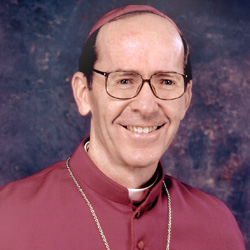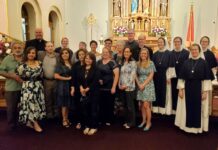“Give me liberty or give me death,” Patrick Henry’s famous cry, at our nation’s birth, continues to stir hearts today; the struggle for freedom is no less urgent now, as evidenced in rallies and fortnights throughout our country protesting against the HHS mandates and other threats to religious liberty. This struggle continues because the cause is worthy of sacrifice. One need only think of John the Baptist and Thomas More to see the close link that exists between freedom and the ultimate sacrifice.
What does it mean to be free?
When we use the word freedom, we do not necessarily mean religious freedom specifically, although that is an important kind of freedom since it is the first, the ability to relate without coercion with our Creator. Freedom is at the core of our existence. Without a clear understanding of this reality, efforts to promote religious freedom could be counter-productive, and deeper confusion and even conflict could erupt.
The U.S. Catholic Catechism for Adults says this about freedom, “Human freedom is more than the capacity to choose between this and that. It is the God-given power to become who He created us to be and so to share eternal union with Him. This happens when we consistently choose ways that are in harmony with God’s plan… Ultimately, human freedom lies in our free decision to say ‘yes’ to God.”
Freedom comes to us as a gift; Christ makes us free by offering Himself in the sacrifice on the Cross and by sending us the gift of the Holy Spirit. St. Paul writes (Gal 5:13), “Remember that you have been called to live in freedom — but not a freedom that gives free rein to the flesh. Out of love, place yourselves at one another’s service.” The gift of freedom requires a response on our part, an ongoing response sustained by both faith and reason, and supported by God’s grace.
Growing in freedom
The gift of freedom introduces a kind of drama in our lives. The Catechism of the Catholic Church describes it this way (#1733-4): “The more one does what is good, the freer one becomes. There is no true freedom except in the service of what is good and just. The choice to disobey and do evil is an abuse of freedom and leads to ‘the slavery of sin’… Progress in virtue, knowledge of the good, and ascesis enhance the mastery of the will over its acts.” When we meet people who are holy, when we study the lives of the saints, we see what authentic freedom is like; we see how growth in virtue leads to growth in freedom.
Sadly, our Catholic teaching on freedom is not well understood and is even rejected by many in society today. Licentiousness is falsely touted as freedom, and is energetically promoted by hedonistic forces in popular culture. This leads to the opposite of love. For it tempts people to use others as objects of pleasure, rather than to make a gift of oneself for their good. On the other hand, the virtue of chastity counteracts hedonism and, by daily effort to grow in this virtue, one’s ability to love steadily increases, with the aid of the Holy Spirit. Where love grows so does freedom.
Fierce independence and exaggerated self-sufficiency, so common today, also erode authentic freedom; as does the pursuit of one’s own interests with disregard for the good of others. Initially and for a time, persons may celebrate such actions as freedom but, in fact, they enslave the heart, turn one away from God, and lead to lonely isolation from others. But the virtue of obedience counteracts this spiritual imprisonment. Aided by the mercy of God, we can learn to submit our will to the Lord’s plan for our life and to trust in His loving providence. When that happens, we discover that true freedom is actually rooted in natural inclinations toward what is true and good.
Free with the help of God
In his message for the 2012 World Day of Peace, Pope Benedict said the following about freedom, “Only in relation to God does man come to understand also the meaning of human freedom. It is the task of education to form people in authentic freedom. This is not the absence of constraint or the supremacy of free will; it is not the absolutism of the self. When man believes himself to be absolute, to depend on nothing and no one, to be able to do anything he wants, he ends up contradicting the truth of his own being and forfeiting his freedom.”
The gift of human freedom is like a seed planted by God deep within each person, one that needs to be watered, cultivated and aided by the grace of the Lord. A process of education is required, in which we learn not only what it means to be free but also what false freedom is. We learn, too, what it means to be human and then what steps are needed to grow to maturity in Christ.
While all of us struggle with temptations against love, which are temptations against true freedom, and while we are familiar with weaknesses of will and intellect caused by original sin, the natural inclinations we have within us do not hinder freedom. In fact, they are actually freedom’s source planted within us by God.
In the next part of this series on freedom, I shall look further at these natural inclinations and desires, and at how education for freedom helps us to develop the discipline and virtue needed to cooperate with God and become truly free.
—
This column appears in the Aug. 16, 2012, print edition of The Catholic Sun.





![[VIDEO] Make Sunday feel like Sunday again](https://www.catholicsun.org/wp-content/uploads/2021/04/2021-YOUTUBE-BISHOP-MESSAGE-THUMBNAIL-ENGLISH-218x150.png)
